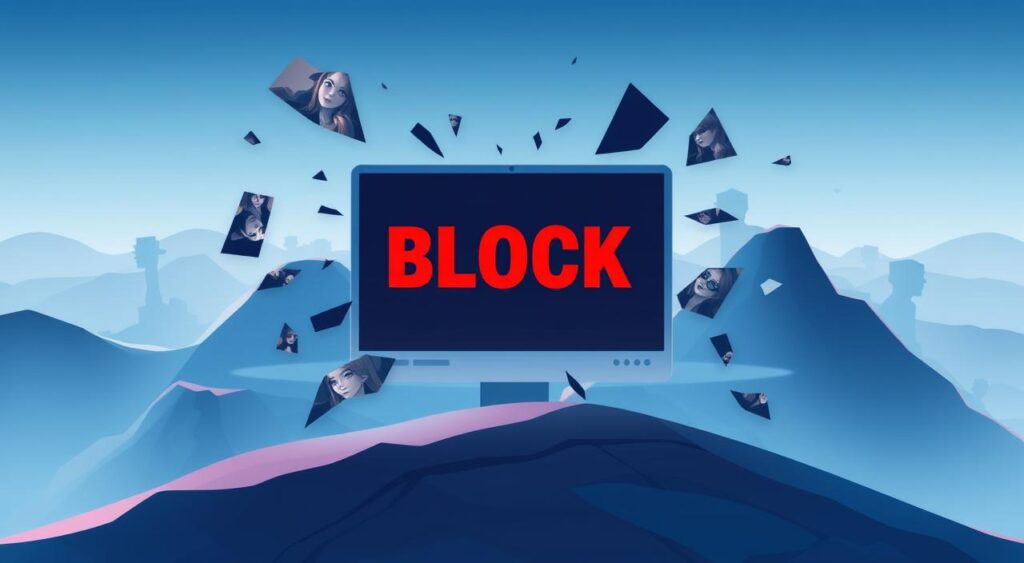Have you ever been in a relationship with a narcissist? It can be tough to realize you were in an unhealthy situation. But, it’s a key step towards healing1. Getting over the emotional hurt from a narcissistic partner is hard, but you can do it. You might have to go through tough memories, question your past, and even think about going back to the toxic relationship1. Learn what to do when a narcissist leaves you alone.
It’s important to see how narcissists manipulate people, sometimes even leading to violence1. Being in such a relationship makes you feel guilty, ashamed, and it’s hard to leave it behind. But, it’s crucial to break free.
Key Takeaways
- Relationships with narcissists often leave individuals feeling a sense of longing or unrequited love.
- Recovering from a narcissistic relationship involves redirecting energy into more positive and fulfilling areas.
- Maintaining a “No Contact” strategy is crucial when dealing with a narcissist, even when there are shared responsibilities.
- Remaining emotionally neutral and avoiding giving attention to the narcissist can help disempower their manipulative tactics.
- Seeking support from a coach or therapist can aid in rebuilding self-trust and confidence after narcissistic abuse.
Understanding the Narcissist’s Motive for Leaving
When a narcissist leaves you alone, it’s key to see their real reasons. They love control and attention, and often use the silent treatment to get power back2. They might stop showing love and talking to you to make you react, as they need your emotions to survive2.
Narcissists Thrive on Control and Attention
Narcissists need to be the main focus and control their relationships2. If they feel threatened, they might act out or manipulate to show they’re in charge2. Knowing this can help you not take their actions too seriously.
The Silent Treatment: A Narcissist’s Manipulation Tactic
The silent treatment is a big sign of a narcissist’s manipulation3. They might stop talking to you, leaving you feeling lost, to take back control3. This is often to punish you for not doing what they want or to make you react so they can blame you.
Knowing their motives helps you understand their actions and not blame yourself2. By seeing their need for control and attention, you can handle the situation better and focus on healing yourself.
Embracing the “No Contact” Rule
Following the no contact rule is key to healing after a relationship with a narcissist. This rule helps you stop the abuse and focus on your own healing4. By detaching from a narcissist, you take back your power and can move forward4. Staying calm and not reacting emotionally to the narcissist’s actions lets you regain your energy and act authentically4.
Why No Contact is Essential for Healing
Going no contact means cutting all ties with the narcissist, direct and indirect. It’s hard because narcissists may try to trick you back with false promises or guilt trips5. They might threaten to leave or stay elsewhere to keep you in their control5. People who’ve been abused by narcissists often find it hard to set boundaries and face their abusers because they fear being hurt again5.
Strategies for Maintaining No Contact
- Block the narcissist on all social media and communication channels.
- Avoid responding to any attempts at contact, even if they appear to be benign or benevolent.
- Seek support from trusted friends, family, or a therapist to help you stay focused on your healing journey.
- Develop a plan to handle any potential encounters, such as leaving the situation or firmly stating that you do not wish to engage.
“The process of detaching involves clearing wounds, taking authentic, empowered actions, and achieving true empowered detachment.”4
The no contact rule is vital for healing after a narcissist. By using these strategies, you can focus on your well-being and escape the abuse cycle45.
Blocking the Narcissist on Social Media
Blocking a narcissist on social media is a key step to protect your emotional health. They often use these platforms to make you feel left out or jealous. By blocking them, you can focus on healing without their constant updates.
Narcissistic personality disorder makes people act grandiose and need lots of praise. They might block you to control or manipulate you. This shows how complex their actions can be on social media.
Being blocked can make you feel watched and anxious. It’s important to look after your feelings and set boundaries. Getting support from friends or professionals can help a lot. Joining groups online can also be helpful.
It’s key to be strong and confident on social media. This helps you deal with being blocked and keep healthy online relationships.
Narcissists often feel bad when a relationship ends because they think highly of themselves. They might ignore your boundaries and make you feel guilty. The best way to handle them is to block their social media and contact details.
Many people face partial blocking in their online relationships. Grandiose narcissists quickly move on, seeing the no-contact rule as proof they don’t need you. Vulnerable narcissists, however, might keep reaching out, trying to get your attention.
Remaining Emotionless During Encounters
When dealing with a narcissist, it’s key to stay calm and show no emotion. They love to get strong reactions from others, which makes them feel powerful6. By staying calm and not showing feelings, you take away what they want most6.
Responding with Indifference to Narcissistic Behavior
It’s tough, as narcissists try to make you react6. But, staying calm is a strong way to stop their tricks6. Don’t let them get you to react or make you feel things you shouldn’t6. Just act like their actions don’t matter to you.
Staying calm with a narcissist is hard but important for healing7. By not giving them the reactions they want, you take away their power6. This is a tough step, but it helps you get back to being yourself and move on.
“The best way to defeat a narcissist is to respond with indifference. Their need for attention and control is their Achilles’ heel.”
Your healing and well-being come first. Keep your focus on your mental health and don’t let the narcissist stop your progress7. With effort and will, you can learn to stay calm, even when they try to make you angry67.
Starting the Healing Process
Starting to heal after being with a narcissist is tough. It can make you doubt yourself and your gut feelings. A supportive coach or therapist who knows about narcissistic abuse can really help you rebuild your trust and intuition8.
They can help you understand why you stayed in the bad relationship. They’ll teach you how to deal with others better in the future. And they can help with any mental health issues like anxiety or depression from the abuse8. Taking care of yourself and being kind to yourself is key during this time.
Rebuilding Self-Trust and Intuition
The narcissist broke down your self-worth and how you make decisions. Getting your self-trust and intuition back is vital. A good therapist can show you how to listen to your inner voice again and set your own limits8.
- Looking into why you saw yourself a certain way
- Doing mindfulness and being more aware of yourself
- Finding ways to stop negative thoughts
Working with a Supportive Coach or Therapist
Getting over narcissistic abuse is hard and emotional. Having a therapist or coach who knows about this can be a big help8. They can help you figure out why the abuse happened, how to cope, and help you heal and become stronger.
“The path to recovery from narcissistic abuse is not linear, but with the right support and self-care, you can reclaim your sense of self and build a brighter future.”
Healing takes time, but with patience, kindness to yourself, and professional help, you can start the healing process after narcissist, rebuild self-trust and intuition, and work with a therapist for narcissistic abuse to take back your life9.
when a narcissist leaves you alone
When a narcissist leaves you alone, you might feel relieved at first. But soon, you might start to miss them deeply10. This feeling of longing for their attention or approval is common after being with a narcissist10. But it’s important to see this as a sign of their manipulation, not true love.
To move past this longing, focus on positive things10. Try self-care, new hobbies, or spend time with supportive people11. Doing these things helps you heal and break free from the narcissist’s control.
Embracing Your Newfound Freedom
Enjoy the freedom you have now that the narcissist is gone11. Do things you loved doing before but couldn’t because of the narcissist11. Let your passions and interests bring you joy and let you grow in new ways.
The longing you feel shows how much the narcissist affected your life10. Acknowledge this feeling to take steps towards reclaiming your power and building trust in yourself10.
“The real narcissist is the one who doesn’t want you to move on and be happy without them. Don’t let them win.”
Be kind to yourself as you heal11. Recovery takes time and you might face challenges11. But with support and a focus on your well-being, you can move past the longing. You can fill your life with purpose and empowerment.
https://www.neverlikeditanyway.com/fixit/how-to-get-a-narcissist-to-leave-you/10
Setting Healthy Boundaries
After being with a narcissist, it’s key to set clear boundaries. Setting healthy boundaries helps you take back your power and keep your emotional health safe as you heal12.
Start by telling others what you expect and what you won’t accept. Be clear about how much contact you want with the narcissist and what happens if they cross your lines12. It’s important to stick to these boundaries, as narcissists won’t change on their own12.
Establishing Clear Expectations and Consequences
Being clear and firm is crucial when setting boundaries with a narcissist. Say what behaviors you won’t accept, like emotional abuse or taking advantage of you financially13. Tell them what will happen if they cross your lines, like limiting contact12. Always put your well-being and safety first13.
It might be hard to keep these boundaries, as narcissists often try to challenge them13. But it’s important to stay strong and follow through with your rules12. This shows the narcissist you’re serious and won’t be played14.
Getting help from a therapist or counselor is very helpful in learning to set and keep healthy boundaries with a narcissist12. They offer advice, tools, and support to make this tough process easier12. Remember, you should feel safe, respected, and in charge of your life14.
Practicing Self-Compassion and Self-Care
Healing from a narcissist’s trauma means being kind to yourself15. Don’t take on the blame alone15. Treat yourself like a friend you care about16.
Do things that make you feel good inside17. This could be sleeping well, eating right, or doing hobbies you love17. Taking care of yourself helps you grow strong and trust yourself again15.
Self-compassion has three parts: being kind to yourself, seeing you as part of a larger whole, and staying present16. It helps you set limits, stop blaming yourself, and fight negative thoughts16. It also helps you manage your feelings and keep your self-respect after a tough relationship16.
Healing isn’t straight forward17. It’s a mix of being kind to yourself and staying disciplined17. With time and effort, you can take back your power and learn to love yourself again15.
“Healing from narcissistic abuse requires immense strength, courage, and resilience.”17
By focusing on self-care and self-compassion, you can overcome the tough times after a narcissistic relationship. You’ll find your self-worth again151617.
Conclusion
Healing from a narcissist’s emotional abuse is tough but possible. Understanding their tactics18 and sticking to the “no contact” rule19 are key steps. Also, setting healthy boundaries and being kind to yourself helps a lot20. You can take back your power and move towards a better life.
You are a survivor, not a victim. With the right support and tools, you can beat the effects of narcissistic abuse. You deserve to live a fulfilling life.
The effects of being left by a narcissist can be deep20. But, the strategies in this article can help you get through it with strength and kindness to yourself. Follow the no contact rule19, set strong boundaries, and focus on your well-being. This will help you take back your life and move forward with confidence.
Healing after a narcissist leaves is hard, but it’s doable with the right mindset and support. Focus on your growth and taking care of yourself. This way, you can break free from abuse and build a life that’s truly yours. You have the strength and resilience to get through this and come out stronger than before. I hope you learnt what to do when a narcissist leaves you alone.
FAQ
What are the key steps for healing after a relationship with a narcissist?
Healing after a relationship with a narcissist involves several steps. First, understand their motives. Then, follow the “no contact” rule and block them on social media. Stay emotionless when you meet them and seek help from a therapist or coach. Lastly, practice self-care and be kind to yourself.
Why is the “no contact” rule essential for healing?
The “no contact” rule helps you break the cycle of abuse. It stops the narcissist from manipulating you again. This rule is key to focus on your healing and avoid being drawn back into the toxic relationship.
How can blocking a narcissist on social media help with the healing process?
Blocking a narcissist on social media protects your feelings. They often use these platforms to provoke you. By cutting off this source of information, you can focus on healing without constant reminders of the narcissist’s life.
What is the importance of remaining emotionless when interacting with a narcissist?
Being emotionless when with a narcissist stops their manipulation. They need your reactions to feel powerful. By staying calm, you take away their control and stop their tactics.
How can working with a supportive coach or therapist aid in the healing process?
A supportive coach or therapist can help you regain your trust and intuition. They can show you why you accepted the abuse and teach you how to cope in future relationships. They also address any mental health issues from the abuse.
Why is it important to overcome the feeling of longing when a narcissist leaves you alone?
Longing for a narcissist’s attention is not true love. It’s a sign of their manipulation and your drained energy. Focusing on self-care and positive activities helps you heal and break free from their emotional control.
How can setting healthy boundaries help in the healing process?
Healthy boundaries are key after a narcissistic relationship. They set clear contact limits and consequences for the narcissist. Keeping these boundaries helps you regain your power and protect your emotional health as you heal.
Why is practicing self-compassion and self-care important for healing?
Self-compassion and self-care are vital for healing from narcissistic abuse. Don’t blame yourself or judge your past. Activities that nourish your mind, body, and spirit build resilience and self-trust, helping you move forward and reclaim your power.
Source Links
- When a Narcissist Leaves You Alone – https://kimsaeed.com/2017/03/06/channelling-one-sided-energy-longing/
- Why the Narcissist’s Leaving is a Blessing – https://yourlifelifter.com/2016/05/25/why-the-narcissists-leaving-is-a-blessing/
- Why Did My Narcissist Spouse Just Disappear? – https://www.keithleylaw.com/blog/2019/august/why-do-narcissists-suddenly-pull-disappearing-ac/
- #1 Reason Why The Narcissist Won’t Leave You Alone | Melanie Tonia Evans – https://blog.melanietoniaevans.com/1-reason-why-the-narcissist-wont-leave-you-alone/
- PDF – https://www.drlindaolson.com/wp-content/uploads/2020/06/Narcissist-Cheat-Sheet-Narcissist-Q-A.pdf
- Lost sense of self: Seven signs you are in a relationship with a narcissist – https://www.stowefamilylaw.co.uk/blog/2019/10/08/relationship-narcissist/
- The Emotional Hangover from Leaving a Narcissistic Relationship by Roberta Cone, Psy.D. – https://www.straighttalkcounseling.org/post/the-emotional-hangover-from-leaving-a-narcissistic-relationship-by-roberta-cone-psy-d
- 7 Tips for Healing from Narcissistic Abuse — Talkspace – https://www.talkspace.com/mental-health/conditions/articles/narcissistic-abuse-recover-heal/
- What Would It Take For A Narcissist To Heal? – https://blog.melanietoniaevans.com/what-would-it-take-for-a-narcissist-to-heal/
- 3 Ways To Get Any Narcissist To Leave You Alone | Melanie Tonia Evans – https://blog.melanietoniaevans.com/3-ways-to-get-any-narcissist-to-leave-you-alone/
- Four Ways To Make A Narcissist Leave You Alone – https://medium.com/the-virago/four-ways-to-make-a-narcissist-leave-you-alone-1877c7a01424
- How to Set Boundaries With a Narcissist | Charlie Health – https://www.charliehealth.com/post/how-to-set-boundaries-with-a-narcissist
- How to Set Boundaries With a Narcissist— Talkspace – https://www.talkspace.com/mental-health/conditions/articles/how-to-set-boundaries-with-a-narcissist/
- 11 Ways to Set Boundaries with Narcissists – https://psychcentral.com/blog/narcissism-decoded/2017/06/11-ways-to-set-boundaries-with-narcissists
- How to Get Over a Narcissist | Charlie Health – https://www.charliehealth.com/areas-of-care/personality-disorders/how-to-get-over-a-narcissist
- Navigating Narcissism: Your 7-Day Journey to Self-Compassion. Day 1 of 7 – https://medium.com/@selfhelpchampion4/navigating-narcissism-your-7-day-journey-to-self-compassion-day-1-of-7-c375446f91bf
- Self Care After Narcissistic Abuse – https://podcasts.apple.com/us/podcast/self-care-after-narcissistic-abuse/id1480674640?i=1000666350968&l=es-MX
- 30 Telling Signs a Narcissist Is Done With You – https://www.marriage.com/advice/mental-health/how-to-know-a-narcissist-is-finished-with-you/
- When the Narcissist Reaches Out — Yay With Me – http://www.yaywithme.com/blog/when-the-narcissist-reaches-out
- Breaking Up and the Discard: How a Narcissist Acts at the End of a Relationship – https://beentheregotout.com/breaking-up-and-the-discard-how-a-narcissist-acts-at-the-end-of-a-relationship/












